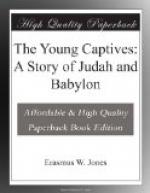Daniel was astonished, and his thoughts greatly troubled him.
“Belteshazzar,” said the king, “let not the dream or the interpretation thereof give thee pain or uneasiness.”
“My lord,” said Daniel, “the dream is to them that hate thee, and the interpretation thereof to thine enemies. The tree that thou sawest, which grew and was strong, whose height reached into the heavens, and the sight thereof to all the earth, it is thou, O king, that art grown and become strong; for thy greatness is grown and reacheth unto heaven, and thy dominion to the end of the earth. And whereas the king saw a watcher and a holy one coming down from heaven, and saying, ’Hew down the tree and destroy it, yet leave the stump of the roots thereof in the earth, even with the band of iron and brass in the tender grass of the field, and let it be wet with the dew of heaven, and let his portion be with the beasts of the field till seven times pass over him,’ this is the interpretation, O king, and this is the decree of the Most High which is come upon my lord the king: that they shall drive thee from men, and thy dwelling shall be with the beasts of the field, and they shall make thee eat grass as oxen, and they shall wet thee with the dew of heaven; and seven times shall pass over thee, till thou know that the Most High ruleth in the kingdom of men, and giveth to whomsoever he will. And whereas they commanded to leave the stump of the tree roots, thy kingdom shall be sure unto thee, after that thou shalt have known that the heavens do rule. Wherefore, O king, let my counsel be acceptable to thee, and break off thy sins by righteousness, and thine iniquities by showing mercy to the poor, if it may be a lengthening of thy tranquility.”
The king, conscious that the Hebrew was under peculiar inspiration, bowed in solemn reverence, dismissed him in the most respectful manner, and then threw himself on his couch, in the deepest agony of mind.
“The fates are against me! What shall I do? Shall I weep like a woman, and sob like a corrected child? Shall the King of Babylon, the great conqueror of nations, turn at last to be a coward? Shall the great sovereign of Chaldea say he is sorry, beg pardon of the gods, and thus reduce himself to the level of a common subject? Never! Let all the gods hear it! Never! ‘Driven from among men!’ Who shall be able to drive Nebuchadnezzar? ‘Eat grass as oxen!’ O, ye gods, is not that laughable? And yet I cannot laugh! Let it come! I fear not the gods! Ah, do I not? I fear not the gods, but still I have a dread of that one God. I destroyed his temple, I plundered his sanctuary, I carried his vessels to the house of my god, in the land of Shinar. Is he about to retaliate? I shall see. Shall I humble myself before a strange god? Shall I now, after having reached the very pinnacle of fame and glory, dishonor myself in the eyes of my nobles? Nay! Sooner than this, I will brave the vengeance of all the gods and nobly perish in the unequal conflict!”




